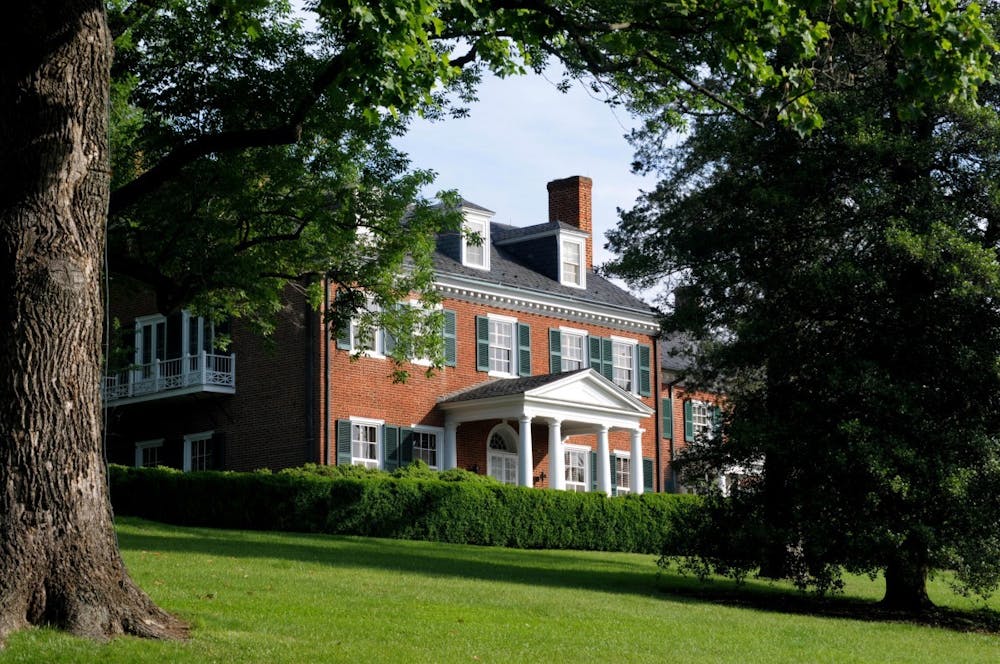The University designates Morven Farm as its first Sustainability Lab, expanding the potential of the environmentally rich property to act as a home for education, innovation and research.
Morven consists of nearly 3,000 acres of the 8,000-acre plot gifted to the U.Va. Foundation by John Kluge in 2001, according to Program Director of Morven Rebecca Deeds. The other 5,000 acres were sold in order to create an endowment for the functioning of Morven.
The property consists of historic residential and farm buildings, rolling fields bordered by mature trees, gardens, a farm and much more. In the 17th and 18th centuries, the land belonged to Monacan tribes. The territory was later colonized by white settlers and later became a large-scale plantation where enslaved laborers lived and worked.
The property has two main stipulations with the gift agreement. Morven must be designated for education and charity. Its historical area — a region of about 800 acres — must be maintained in perpetuity. In recent years, it has been used for symposiums, classes and extracurricular activities. In June, Morven expanded its reach and impact through the announcement that the Morven Farm property will become the University’s “Sustainability Lab.”
“I think that we have a real opportunity to elevate U.Va.’s sustainability portfolio nationally and globally,” Deeds said. “This is one of the greatest gifts ever given to the University so we have a responsibility to activate it to its fullest potential.”
The new designation will allow University students and professors to further study the complex land, structures, culture and history that Morven has to offer.
Plans for new programs include symposiums focused on sustainability and enhancing the Morven Kitchen Garden, the Morven Summer Institute and the First Lady’s Food Lab.
Through the Morven Summer Institute, University professors teach courses, empowering students to think deeply about ethical sustainability. This includes Assoc. Politics Prof. Paul Freedman’s Politics of Food and Architecture Prof. Phoebe Crisman’s Sustainable Communities. This summer, a new course titled Morven’s Enslaved and Descendant Communities was taught by visiting Assoc. History Prof. Scot French and Lenora McQueen, an educator and researcher whose ancestors were enslaved laborers on the Morven property.
The Morven Kitchen Garden provides students with a space where they can broaden their horizons. Through volunteer workdays, internships and leadership programs, the garden creates a community where students collaborate to grow food sustainably.
The First Lady’s Food Lab builds upon Morven Kitchen Garden, expanding, in Deeds’ words, “the capacity of the kitchen garden by creating a real indoor classroom — a meeting space.” Utilizing the garden and produce from MKG, the Food Lab is a host to educational cooking demonstrations, K-12 field trips and other activities and research. These initiatives are undertaken for the purposes of “food justice, community engagement and environmental sustainability, at U.Va. and in the Charlottesville community,” according to Morven’s mission statement.
The new designation will expand opportunities for research at Morven, in environmental sciences and beyond.
Deeds explained that a key collaborator will likely be the Environmental Resilience Institute. The Institute is developing plans for their “Grand Challenges” initiatives, a large investment by the University as part of their Great and Good 2030 Plan into forward-looking and life-changing research. This includes a $60 million commitment for environmental resilience and sustainability.
To make this expansion possible, Morven will recruit an academic director for the new sustainability lab program.
“I think U.Va. has been a leader on sustainability, and that momentum in my view is building and [this new designation] is part of that,” Freedman said. “That's why we released not just a climate action plan [but also] a nitrogen plan and a food action plan. What we are recognizing is that everything that we do, as users of resources, has environmental implications and implications for our sustainability commitment.”
Incorporating not only the property’s environmental wealth, but also its cultural riches, is a key aspect of moving forward with sustainability at Morven.
“In addition to [the environment], we're also charged with activating Morven for other purposes that are related to sustainability, like health and wellness, exploring historical legacy, food, agriculture and community engagement,” Deeds said.
Morven is also a space for community members and groups to engage with the history, culture and landscape, explains Morgan Butler, a Morven Kitchen Garden intern and fourth-year College student.
“It's exciting because it seems like they're focusing a lot on community engagement,” Butler said. “That'll be great to try to make the property accessible to different members of the community and hopefully get more students out here doing research and pursuing different academic opportunities.”
Other events for students and affiliates are hosted throughout the year. This month, Morven Kitchen Garden hosted Gazpacho in the Garden, a celebratory event in which students, faculty, and community members enjoyed the garden’s harvest and local food accompanied by live music, while experiencing the efforts of the student-run sustainable farming program. Around midterms, Morven’s grounds are open to students for reading days of relaxation, complete with dogs, yoga and snacks.
The University’s designation of Morven as the Sustainability Lab represents an expansion of efforts to bring the University community together within its grounds in events like these.
“This understanding of Morven as being central to the University's mission, and in particular its mission as a place where we do research and teach and actually implement ideas about sustainability, that's exactly what Morven should be,” Freedman said.







